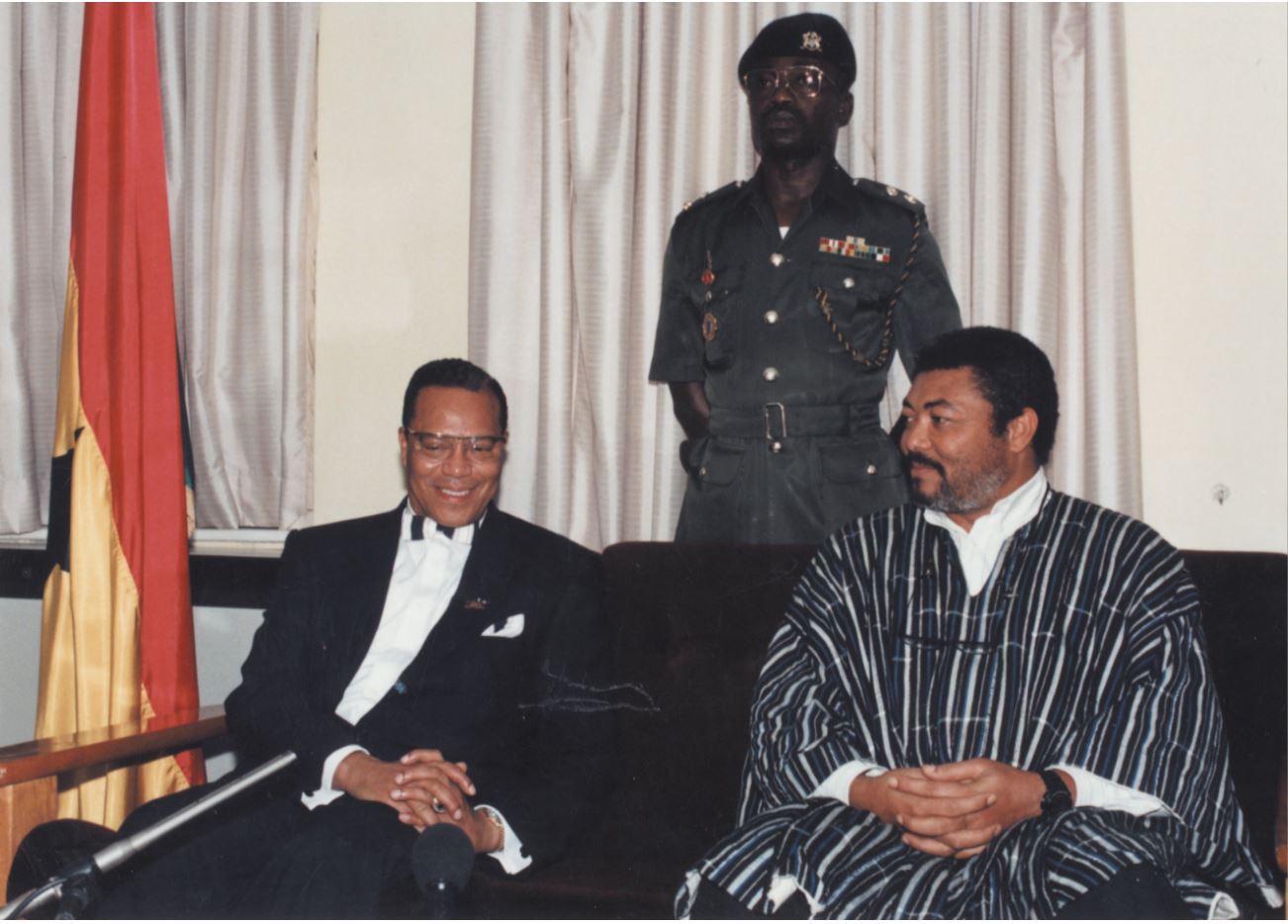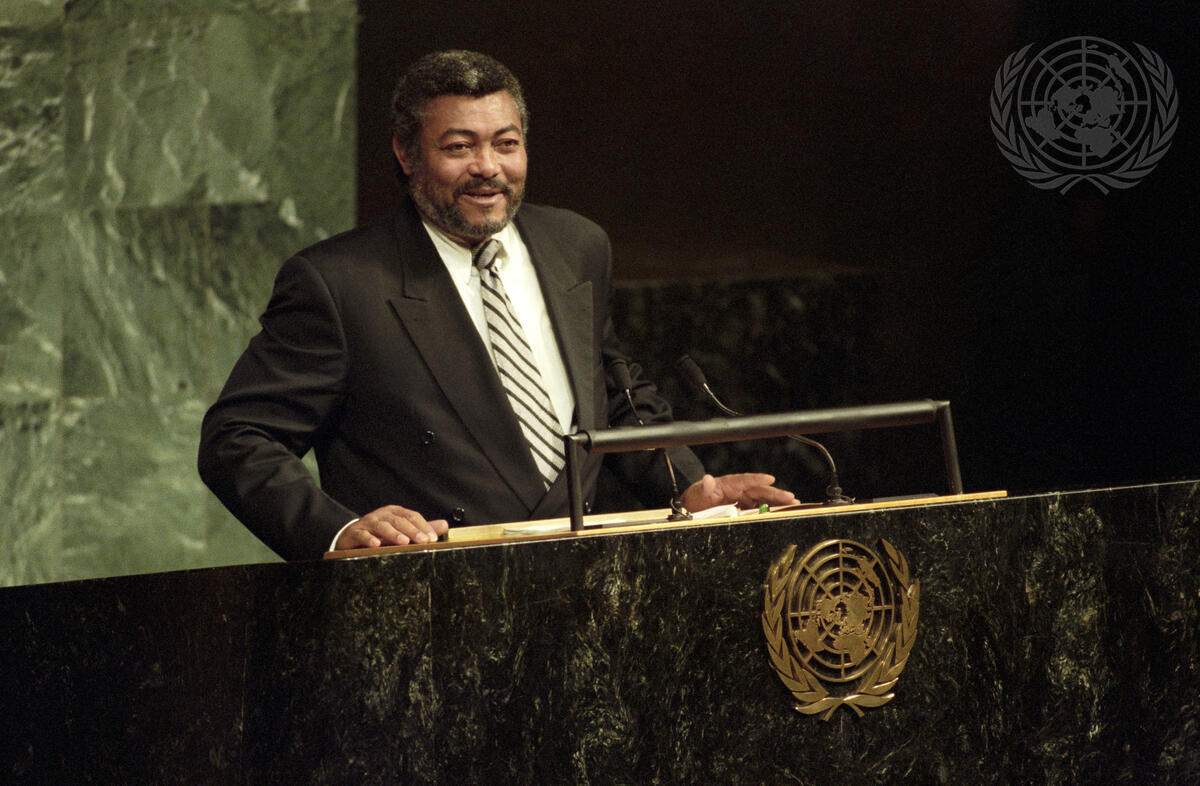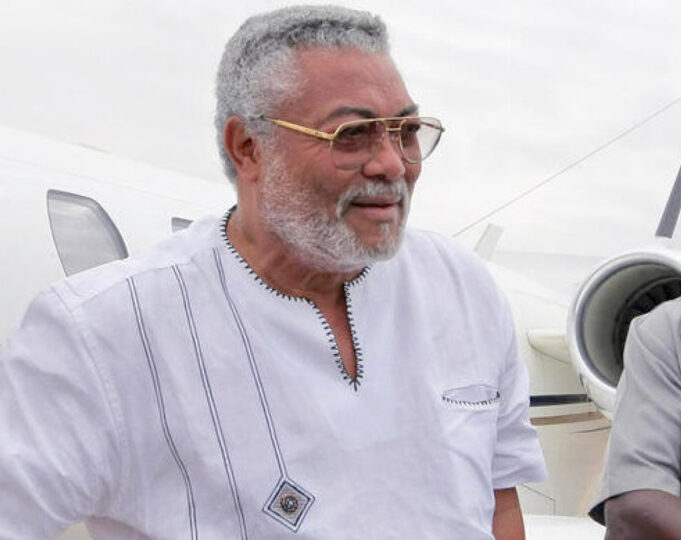Another African tree has fallen with the death of former President Jerry John Rawlings, 73, who led Ghana’s successful transition to a stable democracy from military rule.
“It is with great sadness that I announce to the nation that the first president of the Fourth Republic, His Excellency Jerry John Rawlings, has joined his ancestors,” said Ghana President Nana Addo Dankwa Akufo-Addo, in an official statement released Nov. 12.
President Akufo-Addo directed all flags to fly half-mast and decreed seven days of national mourning for the former head of state. Mr. Rawlings died after a short illness at Korle-Bu Teaching Hospital in Accra.
“A great tree has fallen, and Ghana is poorer for the loss,” stated President Akufo-Addo.
In addition to the national mourning, Ghana is preparing for presidential and parliamentarian elections scheduled for Dec. 7. Ghana’s president, who leads the ruling New Patriotic Party has suspended his re-election campaign until the end of the mourning period.

Likewise, former Ghana President John Dramani Mahama, who is running again as head of the National Democratic Congress founded by Mr. Rawlings, has suspended his campaign as well.
“We will honor him with the same energy and love with which he led our people,” said former President Mahama in a Nov. 12 statement. “We shall never forget his contributions to the cause of Ghana, Africa, and the world,” he said.
Mr. Mahama recognized Mr. Rawlings for his “fight for social justice” and the “principles of probity and accountability” which led to major interventions that among other accomplishments “ended coup d’états” in Ghana. Because of the tenacity of Mr. Rawlings leadership, Ghana is experiencing its longest period of stable, democratic governance in its history, he said.
Flight Lieutenant Rawlings came to world attention when he led a group of young officers in a coup d’état in May 1979 that initially failed. Mr. Rawlings, who took full responsibility for the coup, was imprisoned and court-martialed.

Soon after, on June 4, he was released by junior military officers in another takeover that successfully seized power. Over several months under the Armed Forces Revolutionary Council led by Mr. Rawlings, eight senior military officers, including three former heads of state, were tried on corruption and executed in a purge designed to hand over power to a new civilian government.
In September 1979, the council handed power to the People’s National Party under President Hilla Limann, a former diplomat. However, concerned over persistent corruption within the Limann administration, young Rawlings intervened again on December 31, 1981.
Ghana had been under military rule since 1972 under the guise of curtailing corruption which did not happen, said analysts.
“If anything, they had heightened the variance malfeasances … our economy was in a terrible shape and military officers joined in the bandwagon to exploit the system,” said Kojo Yankah, a former parliamentarian and official in the Rawlings government.
Mr. Yankah told The Final Call that Mr. Rawlings intervened in 1979 as Ghana was preparing to hold elections, but elections could not happen until corruption was uprooted.
“He entered on an anticorruption crusade and he and his men went very far into cleaning the system,” Mr. Yankah said, explaining Mr. Rawlings’ motivation for acting.

Mr. Rawlings ruled the West African nation as the chairman of the Provisional National Defense Council before forming the National Democratic Congress Party and opened the country for multiparty elections in 1992. He was elected president under a new constitution and led Ghana for two terms until 2000. As president, he liberalized Ghana’s economy, encouraging investment in the oil and gold sectors.
Mr. Yankah said the late leader enjoyed popular support because his message resonated with ordinary people.
“He was that no nonsense guy who thought if Ghana should enter into civilian regime, we needed the principles of probity, accountability and transparency,” Mr. Yankah explained.
Mr. Rawlings, according to observers of his leadership, said he refrained from living a life of wealth even while in office. After stepping down because of constitutional term limits, Mr. Rawlings advocated for the common man and stayed close to the people.
After leaving office, he served several international diplomatic posts, including as the African Union’s representative in Somalia.
When men of consequence die, the historians gather the pieces of their life and make their assessment then assign them a place in history. Jerry John Rawlings, born of a Ghanaian African mother and White Scottish father became a man of consequence. Although not perfect, many remember the man as principled, and sincere in his vision and outlook.
“Rawlings was really, a man of the people,” said Attorney Robert Bennett, Ghana’s honorary council general in the United States.
Attorney Bennett said he was regarded worldwide as a “genuine Pan-Africanist” and known by everyday people across the continent.
The Chicago attorney worked closely with Mr. Rawlings and said the loss was quite a shock and like the personal loss of a friend.
“Africa has lost an icon, who spoke his truth and fearlessly defended Africa,” said Ambassador Arikana Chihombori Quao, president of Africa Diaspora Development Institute and former African Union Ambassador to the United States.
There will be many subjective analyses of where history should place Mr. Rawlings.
There will be the view of those affected by the blood spilled in the coups and the view of those who sought relief from neocolonialism, corruption, and tyranny. Then there is the independent view of history that demands an open assessment and weighs a person’s good and bad on balance.
Mr. Rawlings will be weighed like other notable leaders such as the first president of an independent Ghana, Kwame Nkrumah, Gamal Nasir of Egypt, Sekou Toure of Guinea and Muammar Gadhafi of Libya. These men represented a legacy of change and transition on a continent historically controlled and manipulated by foreign powers at the expense of the African people. President Rawlings believed we were riding on the dream of Kwame Nkrumah that Ghana’s liberation is meaningless unless tied to the liberation of Africa and the Black race. He reinstituted the W.E.B. DuBois Memorial Center and brought Blacks from all over to the facility, making it a center for Pan African culture.
As head of state he formed strategic alliances with Caribbean nations and other African nations. In a “Solidarity of Struggle” Mr. Rawlings aligned with Burkina Faso, Cuba, Nicaragua, and Suriname.
Against the wishes of some advisors and risking the ire of America and Britain, Mr. Rawlings invited the Honorable Minister Louis Farrakhan to open an office of the Nation of Islam in Ghana that would serve the African Continent in 1989. He made the move despite a concerted effort by the U.S. government to block African leaders from receiving Minister Farrakhan. Three years earlier Mr. Rawlings was advised not to let Minister Farrakhan in the country, which he refused, opting to judge for himself.
“There were people around him who placed their chips in the basket of the West and willing to do its bidding, telling him don’t let the Minister in,” recalled Abdul Akbar Muhammad, international representative for the Nation of Islam.
“But Rawlings being the brother who is strong and free said, ‘when they tell me to do ‘A’ I do ‘Z,’ and invited the Minister in,” Mr. Muhammad explained.
Mr. Rawlings allowed Minister Farrakhan to address Ghana’s scholars, religious leaders, and the armed forces. “After Rawlings heard him, he said ‘I only find him to be a noble son of Africa,’ ” Mr. Muhammad said.
Minister Farrakhan asked Mr. Muhammad to open the office, which happened in 1990. It resulted in an invitation and approval from Mr. Rawlings, as the Nation of Islam served the people of Ghana through its Ghana Mission and Information Center, for the NOI to hold its first Saviours’ Day convention outside the U.S. borders in October 1994. The event brought 1,800 people—mostly for the first time—to the soil of Africa.
The relationship between Ghana and the Nation of Islam is not political, but birthed from the authentic friendship, comradery and brotherhood of Mr. Rawlings and Minister Farrakhan and love for the people.
They lived the motif of “connecting hands across the globe.”
Dr. Erieka Bennett, the founder and head of mission of the Diaspora African Forum in Accra, Ghana, said, “His legacy will live on forever.” President Rawlings contributed much to the Black Diaspora, she said. “He’s welcomed us home for many, many years,” Dr. Bennett told The Final Call in a phone interview from Accra.
Mr. Rawlings’ opening the door of Ghana to Blacks in the Diaspora is seen by many as the continuum of the vision of early Pan Africanists like W.E.B. DuBois, Dr. Kwame Nkrumah and others. In and out of office he worked to lift up those connections.
In an email statement to The Final Call, the New York-based December 12th Movement joined the African world in mourning the loss and celebrating the life of Mr. Rawlings.
“President Rawlings was an extraordinary man—a true Ghanaian patriot and a Pan-African statesman,” declared Viola Plummer, December 12th chairperson.
The statement brought to mind one of his visits to attend the annual UN General Assembly when he spoke at a community reception for him organized by the group in Harlem. “The President clearly voiced his support for dual citizenship with Ghana for those of us kidnapped from the African continent,” said the December 12th Movement stated. It was another example of Mr. Rawlings’ commitment to people worldwide.
“The passing of Rawlings is an incredible loss, because of the legacy … ushering in democratic systems and electoral processes,” Emira Woods of the International Working Group for Africans Striving for Justice, Peace and Dignity told The Final Call.
“It speaks volumes that he joins the ancestors at this moment in history,” Ms. Woods added.
As the news spread throughout the globe that the former statesman passed, leaders around the continent and abroad sent their condolences to Mr. Rawlings family and the people and government of Ghana. Moussa Faki Mahamat, chairperson of the African Union Commission, was saddened to learn of the passing of former President Rawlings.
“Africa has lost a stalwart of Pan-Africanism and a charismatic continental statesman,” Mr. Mahamat said in a Nov. 12 tweet.
In the West African region that the late president played an influential role during his tenure, his loss was felt. From Monrovia, on behalf of the government and people of the Republic of Liberia, President George Weah celebrated Mr. Rawlings as a “great statesman” of Africa.
“Ghana, Liberia and Africa will miss a great leader,” said President Weah in a statement. “Liberia remembers his immense contribution to the attainment and sustainment of peace during our dark days of our own history,” he said.
Under Mr. Rawlings, Ghana hosted hundreds of thousands of Liberian refugees, displaced by a brutal civil war in the country which he helped mitigate as a leader in ECOWAS, the Economic Community of West African States. President Rawlings will not be forgotten as he leaves a global family that benefits from his contribution. Mr. Rawlings is survived by his wife, Nana Konadu Agyeman-Rawlings, a candidate for president in next month’s elections; his daughters Zanetor Agyeman-Rawlings, Yaa Asantewaa Rawlings, and Amina Rawlings; and his son, Kimathi Rawlings. The former leader passed away two months after his mother Victoria.













